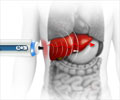10.3% of veterans diagnosed with dementia exhibited elevated FIB-4 scores, indicating a high likelihood of having cirrhosis.

Undiagnosed Cirrhosis and Hepatic Encephalopathy in a National Cohort of Veterans With Dementia
Go to source) It can be difficult for physicians to differentiate dementia from the cognitive decline caused by cirrhosis, called hepatic encephalopathy. If undetected, patients may not receive appropriate treatment that can reverse or halt the impairment. The study, published in the journal JAMA Network Open, sought to learn more about the prevalence and risk factors of undiagnosed cirrhosis and potential encephalopathy in veterans with dementia.
‘Physicians caring for veterans with dementia should evaluate patients for liver disease, even in the absence of a cirrhosis diagnosis. #dementia #liverdisease #cirrhosis’





Identifying cirrhosis early on may unveil reversible causes of cognitive impairment, potentially improving the lives of these patients.
Crucial Role of Liver Health in Dementia Screening
“This unexpected link between dementia and liver health emphasizes the importance of screening patients for potentially treatable contributors to cognitive decline,” said lead author Jasmohan Bajaj, M.D., a gastroenterologist and world-renowned expert in hepatic encephalopathy with the VCU Stravitz-Sanyal Institute for Liver Disease and Metabolic Health and the Richmond VA Medical Center.The researchers believe the findings would apply to non-veterans with dementia, but further research is needed. Bajaj urges clinicians, especially those who encounter patients with dementia, to incorporate liver assessments into routine care for their patients.
“Early detection of liver issues allows for targeted interventions and opens avenues for addressing treatable factors contributing to cognitive decline,” he said.
Hepatic encephalopathy is a nervous system disorder brought on by cirrhosis, an advanced form of liver disease in which patients experience severe scarring of the liver. When the liver doesn’t work properly, toxins build up in the blood. These toxins can travel to the brain and affect brain function, leaving patients confused or delirious. Widely available medications can readily rid the body of toxins and reverse this condition, but without treatment, patients can lapse into coma or die.
Hepatic Encephalopathy Treatment Sparks Study on Dementia in Cirrhosis Patients
Bajaj said the study was sparked by the cases of two older men who were thought to have dementia and Parkinson’s disease, but whose symptoms dramatically improved after being treated for hepatic encephalopathy. One of the men recovered to the point where he resumed driving. Bajaj and colleagues continued to pursue this link between dementia and cirrhosis, publishing findings in 2023 that about 8% of U.S. veterans with cirrhosis had dementia.To look at the flip side, the new study’s authors reviewed medical records of 177,422 U.S. veterans diagnosed with dementia but not cirrhosis between 2009 and 2019. The veterans studied were patients from all across the VA medical system. Roughly 30% of veterans suffer from some form of liver disease.
Advertisement
The study revealed that 10.3% of veterans with dementia had high FIB-4 scores, meaning they were very likely to have cirrhosis. Factors that increase the risk of cirrhosis include older age, being male, congestive heart failure, viral hepatitis, alcohol use and certain health conditions.
Advertisement
The researchers conducted a follow up study at the Richmond VA Medical Center to validate their findings and found similar results, with as many as 11.2% of the patients having high FIB-4 scores.
“The next step is to ensure that health care providers taking care of patients with cirrhosis and well as those with dementia are made aware of a potential overlap with hepatic encephalopathy, which is treatable,” said Bajaj, who has spent the past several years focusing on hepatic encephalopathy and the gut-brain axis.
“Routinely using the FIB-4 index to evaluate dementia could help a significant number of patients, families and physicians by providing an opportunity to treat and potentially reverse cognitive impairment brought on by liver disease,” he added.
Reference:
- Undiagnosed Cirrhosis and Hepatic Encephalopathy in a National Cohort of Veterans With Dementia - (https://jamanetwork.com/journals/jamanetworkopen/fullarticle/2814346)













